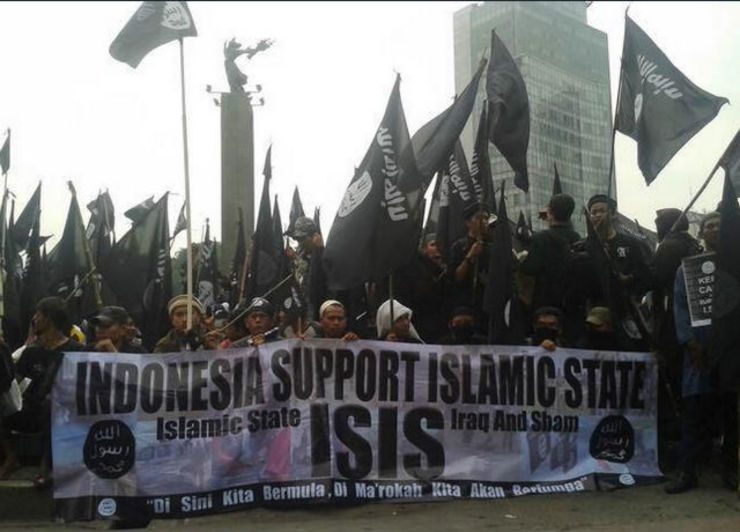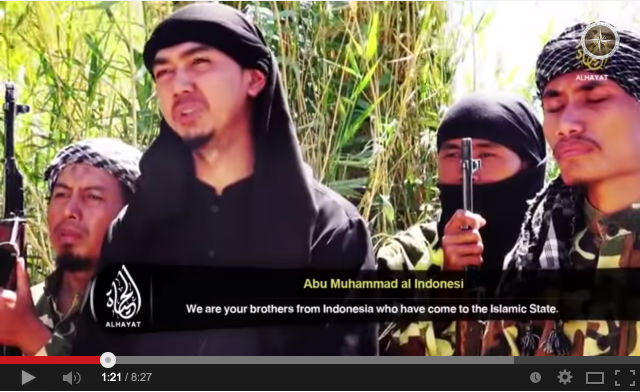SUMMARY
This is AI generated summarization, which may have errors. For context, always refer to the full article.

JAKARTA, Indonesia – The world’s largest Muslim-majority country has denounced the Islamic Caliphate of Iraq and Syria (ISIS), now renamed Islamic State, and is fighting the spread of its ideology on various fronts.
No less than the President and leaders of the country’s largest moderate Islamic organizations have denounced it, and even members of militant groups have rejected it.
Indonesia has announced a multi-pronged response to the growing militant threat in the wake of a new video exhorting Indonesians to join the jihadist group that has declared an Islamic Caliphate encompassing parts of Syria and Iraq. The YouTube video has already been blocked in Indonesia, one of the preventive measures President Susilo Bambang Yudhoyono has ordered be taken.
Other efforts include tighter monitoring of Indonesians traveling to the Middle East, warning that pledging allegiance to the Islamic State could mean losing Indonesian citizenship, and working closely with religious leaders to counter the Islamic State’s message.
‘No place for ISIS in Indonesia’
“Every effort to spread ISIS’ ideology must be prevented. There is no place for such ideology in Indonesia. Indonesia is not an Islamic state. We are a country that respects plurality of ethnicity, religion, and race,” Coordinating Minister for Politics, Law and Security Djoko Suyanto said on Monday, Aug. 5, after a limited cabinet meeting with the president. ISIS, or the Islamic State of Iraq and Syria, is the Islamic State’s old name.
Leaders of Indonesia’s largest moderate Islamic organizations, Nahdlatul Ulama and Muhammadiyah, have also denounced the group. Religious Affairs Minister Lukman Hakim Saifuddin, who comes from Nahdlatul Ulama, said on Friday, August 1, that the jihadist group’s ideology runs counter to the Pancasila, the 5-point philosophical foundation of Indonesia that includes democracy, justice, and humanity.
Any ISIS presence in the country is forbidden, Djoko said, adding that Indonesia’s police, military, and counter-terrorism agency were all monitoring movements related to it throughout the archipelago.
Blocked on social media
“We have also asked the Ministry of Communications and Information Technology to stop efforts to spread ISIS ideology through social media,” Djoko said.
Ansyaad Mbai, the head of Indonesia’s National Counter-Terrorism Agency (BNPT), told Rappler in an interview in July 2014 that the ISIS ideology was spreading fast on social media, which he called “the new machine to recruit militants.”
Blocking the YouTube video and others like it on social media would not completely stop the circulation of ISIS ideology in Indonesia, said terrorism expert Sidney Jones, the director of the Institute for Policy Analysis of Conflict, “but it sends a signal that it’s forbidden.”
 In the 8-minute video titled “Join the Ranks” uploaded on July 23, a man identified as Abu Muhammad al-Indonesi speaks in Bahasa Indonesia calling on Indonesians to join the fight. Police have identified him as a terrorist fugitive Bahrum, who has links to Indonesia’s most-wanted terrorist leader, Santoso.
In the 8-minute video titled “Join the Ranks” uploaded on July 23, a man identified as Abu Muhammad al-Indonesi speaks in Bahasa Indonesia calling on Indonesians to join the fight. Police have identified him as a terrorist fugitive Bahrum, who has links to Indonesia’s most-wanted terrorist leader, Santoso.
The video declares the “good news” that “the Islamic State implements the Sharia of Allah in the entire land,” and that social issues are addressed and help are provided to those who need it. It concludes with a call to join them and pledge allegiance to the leader of the Islamic State, Abu Bakr al-Baghdadi, aka Caliph Ibrahim.
Justice Minister Amir Syamsuddin also said the government was mulling revoking the citizenship of Indonesians proven to have join the Islamic State.
Threat to Southeast Asia
While the Islamic State is gaining support from Indonesian extremists, Jones said its message is being rejected by some jihadist communities.
For instance, jailed Muslim cleric Abu Bakar Ba’asyir, the emir of Jemaah Islamiyah or JI, once al-Qaeda’s arm in Southeast Asia, has reportedly pledged allegiance to the Islamic State along with other convicted terrorists. Ba’asyir has also called on the followers of his extremist group Jemaah Ansharut Tauhid (JAT) to support ISIS. However, Ba’asyir’s children have denounced it.
“Ba’asyir’s family is split, his two sons have rejected it,” Jones said. “This backlash is not surprising. Most Muslims are horrified by the atrocities they see being committed by the Islamic State.”
While these reports of pledges of allegiance to the Islamic State in Indonesia should be taken seriously, Jones said the real concern was that those who have joined would come back with more hard-line ideologies, more training and more weapons.
In the Philippines, a senior Abu Sayyaf leader also posted a video where he pledged allegiance to ISIS. (READ: Senior Abu Sayyaf leader swears oath to ISIS)
Recently, Philippine authorities arrested ISIS supporter Musa Cerantonio in Cebu province and deported him to Australia.
Philippine intelligence sources earlier told Rappler that about 200 Australians, 50 Indonesians and about 20 Malaysians have gone to fight the jihad in Syria. Singapore said it’s investigating one Singaporean, while a Filipino intelligence source said at least one Filipino linked to Abu Sayyaf has gone to Syria. (READ: Southeast Asian recruits join ISIS)
Monitoring travel
Indonesia is stepping up the monitoring of its citizens traveling to Syria or Iraq, or other known points of entry such as Turkey.
Foreign Affairs Minister Marty Natalegawa said his office has asked embassies of Middle Eastern countries in Jakarta to process visa application requests carefully and grant ones only to those with clear and specific purposes.
“But there are constraints. There are countries that grant visas on arrival, so Indonesians can go to those countries without having to apply for a visa,” Marty said.
The problem is compounded by the use of false passports. Given this, Marty said they’re exerting various efforts to address the issue, ranging from inter-state coordination to tightening controls in Indonesia. – with reports from ATA/Rappler.com
Add a comment
How does this make you feel?
There are no comments yet. Add your comment to start the conversation.